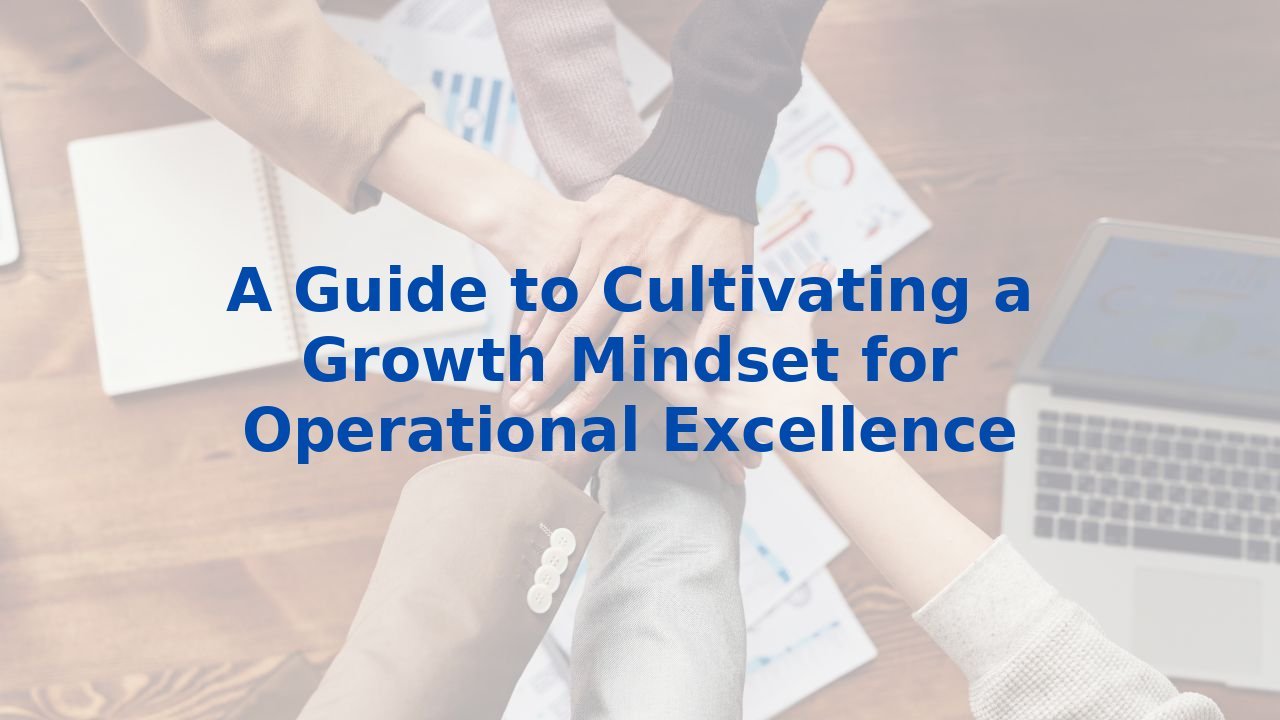A Guide to Cultivating a Growth Mindset for Operational Excellence
A Guide to Cultivating a Growth Mindset for Operational Excellence
Introduction
In a world that never stands still, businesses face a relentless push towards innovation and efficiency. Integrating Artificial Intelligence (AI) into your workflows isn't merely a trend; it's a strategic necessity for achieving operational excellence. This guide sheds light on the essential business processes that can be amplified through AI, while also spotlighting the monumental advantages of training your employees in these transformative tools.
What is AI Process Optimization?
AI process optimization revolves around employing AI technologies for improving business processes. This involves automating tasks, analyzing vast data sets, and aiding team members in making insightful decisions. The core aim? To minimize errors, elevate productivity, and refine operational efficiency.
Key Benefits of AI in Business Process Management
1. Automating Routine Tasks
AI shines in automating high-volume, repetitive tasks. By incorporating intelligent document processing, organizations can transform documents into actionable data without needing human intervention. Imagine your team focusing on strategic initiatives instead of drowning in mundane paperwork.
2. Enhancing Decision Making
With the ability to uncover trends and predict potential outcomes, AI transforms decision-making landscapes. It delivers predictive recommendations based on data patterns, empowering businesses to make informed choices that propel growth.
3. Improving Process Efficiency
The speed of data analysis is crucial. AI accelerates this, allowing businesses to adapt quickly to both tactical and strategic decisions. By setting user-defined parameters, AI can engineer workflows that are not just efficient but also aligned with organizational goals.
4. Risk Identification and Mitigation
AI is a vigilant sentinel in process management, capable of detecting anomalies that may indicate potential risks. By identifying these deviations swiftly, businesses can address concerns proactively, ensuring continuous improvement.
5. Real-Time Monitoring and Optimization
Real-time insights are indispensable in today’s fast-paced environment. AI-driven process mining provides up-to-the-minute status updates on operations, enabling immediate responses to resolve any issues or seize new opportunities.
Practical Applications of AI in Business Processes
1. Sales and Marketing
AI's prowess in predictive analytics offers invaluable insights for sales teams, helping to identify high-value prospects. Furthermore, chatbots streamline customer service by automating responses, significantly enhancing customer satisfaction.
2. Customer Service
AI doesn't just automate; it evaluates. By analyzing the quality of customer service interactions, AI provides feedback that helps maintain top-notch service standards, allowing human agents to focus on more complex inquiries.
3. Product Development
In product development, AI can expedite the creative process through generative design. By inputting parameters, AI can explore potential designs at blinding speed, dramatically reducing time-to-market.
4. Human Resources
AI serves HR by enhancing objectivity and enriching employee experiences. From nurturing talent through personalized career paths to streamlining recruitment, AI positively impacts every facet of human resource management.
The Role of Employee Training in AI Integration
While AI is a powerhouse for operational excellence, its true potential is unlocked through proper employee training. Here's why investing in training is crucial:
1. Enhanced Productivity
Well-trained employees can deftly utilize AI tools, automating mundane tasks and reallocating their focus on high-impact work that requires human insight.
2. Improved Decision Making
Fostering a culture where employees understand AI analytics leads to more judicious decisions that align with the organization's overall objectives.
3. Adaptability
When employees are trained in AI implementations, they become adaptable champions of change, ensuring a seamless transition as new technologies reshape workflows.
4. Reduced Errors
With thorough training, the likelihood of operational mistakes diminishes. This ensures that organizational processes run more smoothly and accurately, fostering a culture rooted in quality.
Conclusion
Integrating AI into your business isn’t just about technology; it’s about cultivating a growth mindset. The efficiency gained through automating routine tasks, enhancing decision-making capabilities, and refining processes can lead to remarkable operational excellence. However, the bridge to maximizing these benefits lies in equipping your employees with the necessary training. By fostering a growth mindset and aligning your organization’s processes with AI capabilities, you position your business for sustained success in an ever-evolving landscape.
If you're interested in learning more about how to train your employees for AI or explore AI training solutions for your organization, consider checking out the Complete AI Training homepage for further insights.



